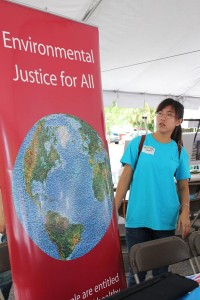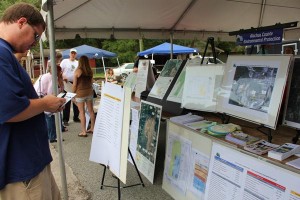 The Eco-Health Festival is a place for everyone in the Stephen Foster neighborhood and greater Gainesville community to come together and learn more about and discuss the issues surrounding the Koppers Superfund site.
The Eco-Health Festival is a place for everyone in the Stephen Foster neighborhood and greater Gainesville community to come together and learn more about and discuss the issues surrounding the Koppers Superfund site.
The festival will take place at the Agape Faith Center (936 NW 31st Ave. in Gainesville) on Saturday, April 21, from 10a.m. to 4p.m., and will include live music, games and entertainment for kids, as well as a long list of speakers. Art from the Superfund Art Project and Kid’s Eco-Art Show will be on display, and the first 500 people to arrive at the festival will receive free food from Thai American Foods.
The goal of the festival is to teach people skills and provide expert knowledge so that residents in the Stephen Foster neighborhood have more options to protect their health. Participants can learn more about the chemicals from Koppers and how to avoid contact with them. Taking common-sense precautions can make a difference.
The Koppers Superfund site is located near our homes in the Stephen Foster neighborhood of Gainesville. For almost 100 years, Koppers produced treated lumber for different purposes, but the chemicals used to make that treated lumber are toxic pesticides that are poisonous to wood-eating organisms, as well as animals and humans. Koppers dumped these chemicals on the ground and in holding ponds on the site, leaving the pesticides to seep into the groundwater and pollute Springstead Creek. Because most of the Koppers site is bare, with no grass covering the dirt, the wind has carried pesticide-contaminated dust into nearby yards and possibly into people’s homes. The Florida Department of Health has told some residents in our neighborhood to stop gardening and to keep children from playing in contaminated dirt.
The Koppers Superfund site is located near our homes in the Stephen Foster neighborhood of Gainesville. For almost 100 years, Koppers produced treated lumber for different purposes, but the chemicals used to make that treated lumber are toxic pesticides that are poisonous to wood-eating organisms, as well as animals and humans. Koppers dumped these chemicals on the ground and in holding ponds on the site, leaving the pesticides to seep into the groundwater and pollute Springstead Creek. Because most of the Koppers site is bare, with no grass covering the dirt, the wind has carried pesticide-contaminated dust into nearby yards and possibly into people’s homes. The Florida Department of Health has told some residents in our neighborhood to stop gardening and to keep children from playing in contaminated dirt.
Koppers has paid millions of dollars to test the soil on the site and in nearby yards to see how much of the pesticides are there, but there is still uncertainty about where they are located in high or low concentrations. These chemicals can be very harmful to animals and humans if enough gets inside of us. The most common way chemicals in dirt get inside is when they are on our hands, and we eat food without washing first; some chemicals can also be absorbed through our skin or by breathing in polluted fine dust particles. Infants and children are most at risk from chemical exposures because they touch EVERYTHING and put their hands in their mouths without washing them first.
Many people in our neighborhood have moved away because they are afraid that the pesticides are causing health problems. Other people are unsure of whether there really is a problem or not. Even though we don’t know for sure how much of the pesticides are in our yards or houses, we can takes steps to reduce the amount that poisons us. We can also protect our health by being aware of the many hazardous chemicals that are typically around our homes and learning how to reduce our exposure to them. This is especially important for pregnant women, infants and children since these chemicals can harm rapidly growing bodies.
The Eco-Health Festival is a place for everyone in our neighborhood to come together and hear people talk about many issues related to living near the Koppers Superfund site.
For more information and a complete list of speakers and musicians, visit www.ecohealthgville.org.


